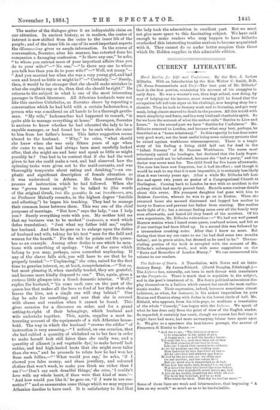CURRENT LITERATURE.
Hard Battles for Life and Usefulness. By the Rev. I. Inches Hillocks. With an Introduction by the Rev. Walter C. Smith, D.D. (W. Swan Sonnenechein and Co.)—The best part of Mr. Hillocks' book is the first portion, containing his account of his struggles in early days. He was a weaver's son, then kept school, now doing, by way of helping-out his income, some weaving (till he found that the occupation left tell-tale signs on his clothing), now keeping shop for a chemist. Then he took to literary work and to lecturing, and got very weak, being almost starved to death in the process. All this is told with much simplicity and force, and in a very kind and charitable spirit. So far we have the account of what the author calls " Battles to Live and Learn." In the second part we have " Battles for Usefulness." Mr. Hillocks removed to London, and became what may best, perhaps, be described as a " home missionary." In this capacity he has done some very good work, not the least useful being some salutary protests that he raised against workhorse mismanagement. There is a tragic story of his finding a living child laid out for dead in the "Infant Nursery" of St. Pancras Workhouse. The nurse most reluctantly untied the bandages, but declared that the Lady Super- intendent could not be informed, because ahe " had a party," and the doctor was never sent for. The child lived for five hours afterwards.
The case has been now forgotten, but it had its effect ; and though it would be rash to say that it is now impossible, it is certainly less likely
than it was twenty years ago. After a while Mr. Hillocks left Lon- don and spent two years as pastor of a Congregational Church at Darlington. Coming back to London he met with an accident in the
railway which had nearly proved fatal. Retells some curious details about this event. His youngest daughter had gone with him to
Dalston Junction, whence he was to go on to Easton. When she returned home she seemed distressed and begged her mother to hurry to Euston and prevent her father from starting. Her mother made light of it ; but a strange feeling came over all the family very soon afterwards, and lasted till they heard of the accident. Of his own experience, Mr. Hillocks writes thus :—" We had not well passed Harrow station when I heard some queer, confused noises, and felt as if our carriage had been lifted up. In a second this was followed by a tremendous crushing noise. After that I knew no more. But during that time my son came to me [he had died some two months before], not in grave attire, but dressed as he used to be." The con- cluding portion of the beak is occupied with the account of Mr. Hillocks's subsequent work, and with some suggestions on the "Roots and Remedies of London Misery." We can recommend this volume to our readers.














































 Previous page
Previous page